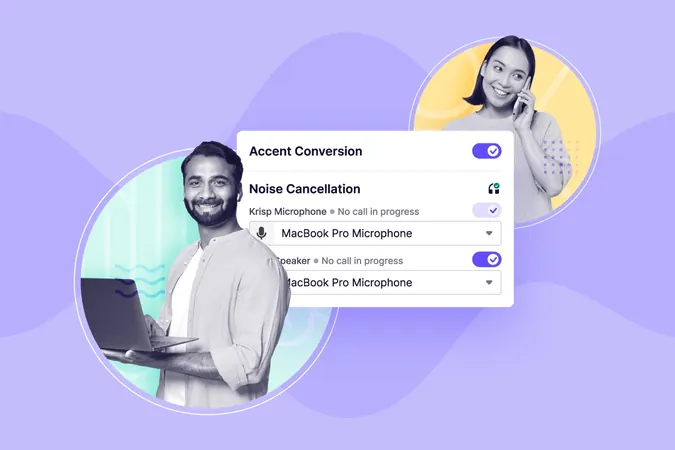
Revolutionizing Communication: Krisp's AI Tool Helps Indians Speak with an American Accent on Calls
2025-03-26
Author: Wai
In an exciting development, audio startup Krisp has unveiled a groundbreaking feature that leverages artificial intelligence to modify users' accents during calls. Initially, this innovation will focus on transforming Indian English accents into American English, catering specifically to a market where misunderstandings and communication barriers can often arise.
Krisp's accent conversion technology is designed to maintain the natural tone of the speaker's voice, altering only specific phonetic elements to align them with American pronunciation. Following successful trials in enterprise settings, the company is rolling out a beta version of this feature in its desktop application, allowing users to activate it at any point before or during their calls.
Co-founder Arto Minasyan shared insights into the genesis of this feature, revealing that his own experiences sparked the idea. Despite having a strong command of English, he often faced challenges in making himself understood. "Many people don’t understand my accent even though I am speaking English well. We thought changing accents might help people understand each other much better. We started working on this problem two years ago, and now we are releasing it in beta," Minasyan explained.
While initial tests of the feature showed promise, some users reported that the processed voice lacked a natural quality and occasionally omitted words. Krisp has acknowledged these teething issues, attributing them to the beta phase, and is optimistic that the model will refine and evolve over time.
Interestingly, Krisp's research suggests that the introduction of this accent modification tool has significantly beneficial implications for businesses. In trials conducted with enterprise users, companies experienced a remarkable 26.1% increase in sales conversion rates and a 14.8% upsurge in revenue per transaction.
The decision to focus first on Indian accents stems from the substantial presence of Indian professionals in global STEM sectors. Given this demographic's important role in the workforce, Krisp plans to expand support to additional accents, including those from the Philippines, in the near future.
Competition in this domain is growing; other startups, such as GV-backed Sanas, have already begun implementing similar solutions on a wider scale within call centers, highlighting a burgeoning interest in accent modification technologies.
Krisp indicates that they trained their model using thousands of speech samples, accounting for various accents and dialects. The data was sourced from their meeting assistant tool, always with explicit user consent.
Another significant advantage of Krisp's innovation is its capacity to create a unique voice profile for users in real-time, eliminating the need for any prior voice training. With this feature, Krisp not only aims to enhance clarity in communication but also to bridge cultural gaps in the increasingly globalized workplace.
As Krisp rolls out this feature, it highlights an important trend in technology: the quest for more inclusive communication tools that respect and enhance the diversity of voices in our interconnected world.







 Brasil (PT)
Brasil (PT)
 Canada (EN)
Canada (EN)
 Chile (ES)
Chile (ES)
 Česko (CS)
Česko (CS)
 대한민국 (KO)
대한민국 (KO)
 España (ES)
España (ES)
 France (FR)
France (FR)
 Hong Kong (EN)
Hong Kong (EN)
 Italia (IT)
Italia (IT)
 日本 (JA)
日本 (JA)
 Magyarország (HU)
Magyarország (HU)
 Norge (NO)
Norge (NO)
 Polska (PL)
Polska (PL)
 Schweiz (DE)
Schweiz (DE)
 Singapore (EN)
Singapore (EN)
 Sverige (SV)
Sverige (SV)
 Suomi (FI)
Suomi (FI)
 Türkiye (TR)
Türkiye (TR)
 الإمارات العربية المتحدة (AR)
الإمارات العربية المتحدة (AR)